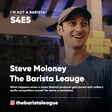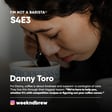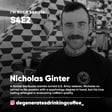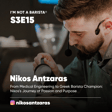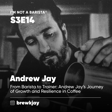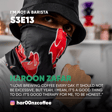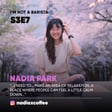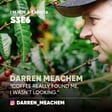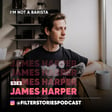Introduction: Passion for Coffee
00:00:06
Speaker
Welcome to the I'm Not A Barista podcast. We're here to talk about all things coffee from industry careers, brewing tips, community support and more with some really incredible people who love coffee as much as you do. We hope their stories inspire you because humanity runs on coffee and together we can empower all the people behind every cup.
Anisha's Coffee Journey
00:00:34
Speaker
And welcome to M Now Barista podcast. Thank you. Thank you for having me today. So how's it going today? Are you working today? Yeah, working. Yeah. So basically for me, um, because I run my own place, so you kind of work like around the cloud every day. But yeah, so I guess after the competition, it's about catching up before the works and et cetera. So where now it's actually at the road street. And it's also where we do our e-commerce, tasting our coffees and et cetera.
00:01:02
Speaker
Could you tell us more about yourself, who you are, where you're from, and how you started your coffee journey? All right. So I'm Anisha. You can call me just by Ellie.
00:01:14
Speaker
I'm from Singapore. I run a place called Home Ground Coffee Roasters. We are turning five years old this November. So basically we started off the company with the intention of or rather with the vision of getting more people to make coffee at home. So hence the name Home Ground. So that's how we actually curate our coffee selections as well as how we do our cafe setup and etc.
Achievements and Passion in Competitions
00:01:41
Speaker
lucky enough to come in third place this year for the World World Cup Championship in Melbourne. It's actually my second time at the Wolves. My first time was in Boston and it's my fourth national. So how I actually started this whole coffee journey was just simply because like I was looking for something that I wanted to do as my career. I'm sorry to get this bought very easily. I don't like to play games because I always feel that it kind of gets
00:02:09
Speaker
After a while, you're doing the same thing. Images with slight difficulties, different difficulties. But for coffee, it's always very different every day. I like the challenge that I get when I make coffee, which is why I enjoy doing coffee and how I got myself into coffee. All right. Can you tell us how many years have you been in the coffee world?
00:02:33
Speaker
Yes, so I started off as a part-time with the intention of wanting to set up my own place eventually. Yeah, and then eventually move on to a full time. After doing full times for like about two years, that's when I set off Home Brown. So initially it was just based online and we're just doing pop-ups at different cafes and different coffee festivals. And then eventually we have our own space. So yeah.
00:03:01
Speaker
What was your first job? Were you a barista in the beginning or were you working on it? Yes, I was training to be a barista. How was it like? I guess I was very lucky because I think that at that time, it was during the time of Medperger, the time of the introduction of EK43. When you get introduced to many different fancy machines, fancy equipment, and the introduction of weighing skills,
00:03:30
Speaker
Well, if you were to start earlier, there's no such thing as weighing skills. When you do espresso, you look at the color of the espresso from blending, the tiger stripes, and et cetera, to the use of weighing skills. And then for brewing, it was just all by feeling. So yeah.
00:03:51
Speaker
I would consider myself lucky because with all these introductions of different equipment, it actually helps to improve consistency and it helps when it comes to becoming a new skill because it's easy to replicate. So we'll keep you in the coffee industry after eight years.
00:04:08
Speaker
I think at a different stage of my career, I'm actually looking forward to different things. And the Asia phase, of course, is about pursuing for a very good cup of coffee. And then eventually it becomes like, how are you able to consistently produce a good cup of coffee?
Barista Career: Challenges and Growth
00:04:23
Speaker
And it then later turns into being able to share this coffee with many people, like your customers.
00:04:32
Speaker
That was the drive. And then recently it was a bit different. It now becomes more drive me towards. I'm more driven by getting more people to want to invest in coffee or rather invest themselves as a barista. So why is barista a career for many people? And it's a career that has career progression. So that's my drive and my motivation now or what I want to do now.
00:05:01
Speaker
Yeah, because we are seeing, or rather in Singapore, I'm seeing that like there are a lot of people who are living in the industry. There are many people who no longer see a progression or they feel that this is not something that they can do for a long time and even get comments like, this is not a real job. Well, which I definitely don't think that that is true. So yeah, that's what I'm looking forward to do.
00:05:27
Speaker
and why I'm still in this industry because I believe it's a job that requires both EQ and IQ and a lot of money on the craft as well. So yes.
00:05:40
Speaker
Yeah, I'm pretty sure about that. I had some friends competing this week for a championship and did training, practiced all the time, spent a lot of time and energy on this. But for people outside the coffee industry, I guess it's hard to understand. It's a cup of coffee, right? But it's so complicated about it. And when you're saying that,
00:06:04
Speaker
There's not much progression there left in the barista profession. If, for example, someone wants to leave the coffee industry, they work as a barista, they don't see so much room for them to grow and to develop. How would you persuade them to stay? Or would you even try to persuade them? Definitely, I'm going to try.
00:06:27
Speaker
Yeah, definitely I will still give it a shot, but I guess it's also first to understand what makes them want to leave because I've come across so many verses that I've met at the beginning of my career who are so passionate, but they now all want to leave. I think very often it's because they don't see the result and they don't see the return, whether it's monetary wise or appreciation from their company and et cetera. And after being let down for so long and the long physical hours and et cetera,
00:06:56
Speaker
coming from all different directions. Everyone on the environment and everything is sending them a message like, no, this is not a career for a long time. And they feel that it's not a sum of money that they can survive with if they want to start a family.
00:07:13
Speaker
Particularly in Singapore, it's a pretty expensive city to stay in or to leave. So yeah, these are all the reasons, which is why understanding all these helps me as a business owner to grow my company and know what are the things that we need to work on.
00:07:30
Speaker
How do we ensure it's not just about progressing as a barista, like maybe you move on to different departments or things like that. I guess it's also creating a very positive working culture, which I've never thought of, which I've never put much thoughts into until very recent years, because I always thought that if you enjoy something, you do something every day, that's good enough. But of course, that's not going to be sufficient.
00:07:55
Speaker
you have to deal with very real problems like people are not performing at work and someone has to cover
00:08:04
Speaker
I won't say cover them up, to work on their behalf. And of course, low paying jobs, Brister is not valued as a skilled worker, things like that. But at the same time, many business owners require them to know many different things. They need to have very good customer service. They need to know how to interact with customers. They need to know how to make coffee. They need to know the different
00:08:31
Speaker
processing method. They need to know the different variables. They need to know how to make a good sales pitch. There's so many things they need to know, but their skills are very often undervalued.
00:08:44
Speaker
What we are doing now at Homeground, it's not just also about culture. We are working on a system whereby how can we do gradual pay increment and attracting the right people to work with us.
Cultivating a Positive Work Culture
00:08:56
Speaker
I don't ever dream of changing the entire F&B industry, but I guess what I can do within my control is to do what I can do with Homeground. I can really believe that most coffee shop owners, business owners, they want their employees to be the best.
00:09:14
Speaker
but they don't want to pay the most. When was the first time you competed as a barista? I think it was in 2017. Yeah, it was my first bro's cup. Well, because it's your first competition. Clearly, you do not know anything. Despite reading the rules and regulations, many like a no. Just trying to go with the flow.
00:09:43
Speaker
So yeah, I really didn't put too much thoughts into it to me. It was just like, ah, there's a competition for coffee. So since I enjoy brewing so much, I just want to see how would I do and how would I
00:09:55
Speaker
Where would I stand compared to the rest? It really is just for fun. Eventually, after my first experience, I know that I want to win the competition because I want to do well, of course. That is what encouraged me. With all the experience that I have, I want to carry forward to my second competition and make it even better.
00:10:19
Speaker
So yes, and if we were to talk about my second nationals, I got disqualified. So for anyone who hasn't participated in Brewers Cup, there's a ways to come to section. One is your open service, which is the one that people get to see your 10 minutes of presentation and get to use any coffee that you like. And the second one, it's what we call a compulsory service where you'll be given a mystery bin and you have to brew it within a given time and et cetera.
00:10:47
Speaker
So of course, to ensure that the judges have sufficient coffee to judge and assess, there's a minimum amount. So I actually underpoured for my compulsory service. So I was given a five-ounce cup, which is about 150ml, and the required amount was 120ml. So to heat 120ml, you really have to pour the coffee to the brim.
00:11:10
Speaker
But I was looking at the runners. I was afraid that they might spill the coffee and it's very hard for them to carry. So without thinking so much into the rules and regulations, actually underpawn my coffee. Then the moment when I walked out, I was like, shit, I think I screwed up. Like I really screwed up. So I went home, I started crying and everything. And the next day was my open service.
00:11:36
Speaker
I was like, I don't really want to go for my open service because I was very sure that I got disqualified.
00:11:43
Speaker
And then by then my roaster, he actually encouraged me saying, you should still do it because it's still two different sessions and the test on two different skills. Go for it. Do your best. Whatever that you can do and the results that you get and the feedback, most importantly, that you get from your judges would benefit you in your next competition. You shouldn't just give up. So I took his advice. I did it. I went for it. And on my third national, I managed to nail the competition and came in first.
Lessons from Competitions
00:12:12
Speaker
Wow, what a story. I want to ask you this question because you mentioned that the importance of being a barista and not giving up and also the barista, they need more motivation, right? Because sometimes they don't see what is there for them if they continue, if they
00:12:35
Speaker
compete or even they just want to work more. So what happened after your first championship become the champion? And what changed in your life? Did you get more salary or you get some sponsorship? I guess this is something other baristas want to see, right? If I become the champion, oh, I got to have a new house. I got to have a new car. I was there for you. Well, I really wish that like, if a championship brings me a new car, a new house, unfortunately, that's all.
00:13:06
Speaker
I guess after doing the first national, I mean like you're coming as a champ, winning the competition, the next focus was always be the competition at Worlds. How do you prepare for Worlds? And it's a very similar feeling like when I did my first national like
00:13:26
Speaker
When I go to Worlds, I'm a complete no. I do not know anybody. I do not know what's exactly going on, what is the difference. And because in Singapore, it was always very, we have a very stable environment. I'm referring to the weather. So like day and night more or less is the same, which is whether it doesn't rain or it doesn't. But when we were in Boston, it's a complete opposite. Like the humidity in the day and night is different. And that's when I realized that like,
00:13:57
Speaker
Coffee reacts very differently based on the environment as well. And we were not prepared enough for that because we did not consider that as one of the variable. So with that in mind, I have been holding it for so long because there's so much more that I want to do as a barista to make a good cup of coffee under any given condition.
00:14:19
Speaker
That's when I decided to go for my fourth nationals. And I wanted to apply whatever challenge that I face and move my solution that came out with to my next world, which is that Melbourne. So yeah, honestly, in terms of sponsorship or what, so yes, I agree. You actually get, you do get sponsorships, my drippers, my ring scale. A couple of things are all sponsored.
00:14:49
Speaker
They're not going to change your life like give your house or buy your car. It's just small items. Yeah. So it gives the brands exposure, of course. But for me, all the sponsorships that I get, I see more of like a
00:15:04
Speaker
a gift from a friend who believes and wants you to do well. And for people who doesn't even ask for anything in return, to be honest, because these are the brands that I've been working with even way before COVID or way before my third nationals. So it has always been there because
00:15:24
Speaker
Many of the people that I work with, they started off from zero as well. Small company, no support. Sometimes it's just themselves. Yeah. But we choose to believe in each other because we share the same vision of wanting to make better coffee. So for me, instead of seeing it as a sponsorship, I see it more as like a team effort, you know? Although I'm just standing there alone, but I feel like there's a lot of people behind me. So when the announcement of like, when I got into top six this year evokes, so many of them cry. I mean, including myself.
00:15:54
Speaker
Right? It was the kind of emotion that I feel that we have been holding back for a long time, particularly in between that was also COVID. So a lot of competitions and events are put on hold and you don't even get to meet them very often. But if there's anything that what championship does bring you, I also think it gets, well, when you go to the world, you get to meet many different people at the backstage.
00:16:21
Speaker
almost everyone is very friendly and there are people who are already the national champions and they love to talk coffee about coffee as much as you do and they have like many different interesting ideas and most people are very willing to share so I guess for me that was a very good takeaway whether is it in Boston or in
The Dynamic Barista Role
00:16:42
Speaker
Thanks for sharing. I want to share my secret too, because I'm drinking coffee done brewed with your recipe. This year's, what do you call it? Do you have a name for that? Like 60, 70, 50, 60?
00:16:55
Speaker
No, so actually, to be very honest, my recipe actually changed from nationals and even for worlds, my first round and my finals, my recipe is different. Like I mentioned earlier on, so I actually brew coffee as according to the humidity. So I actually have a hydrometer with me when I make my coffee and even when I grind my coffee. So that actually helped me to make better decisions. Wow.
00:17:21
Speaker
Yeah. So this is something every barista should expect in their career? Yes, but that makes it exciting also, right? Well, I mean, this is one of the biggest reasons why I like to be a barista, because nothing is constant. But at the same time, you challenge yourself to make a consistently good cup every time. Well, so what do you think barista, let's say this profession, what kind of personality will shy working as a barista?
00:17:52
Speaker
I think there isn't one personality, there's multiple. So if I were to talk about the people that works at Homeground, we have got those supermodels who love to be at the bar, like as if it's their runway.
00:18:07
Speaker
and they like to share. They really shine through the way they carry themselves and how they talk about it and sometimes they like to relate or rather how they describe coffee. It's very much close to like fashion or day-to-day terms where people understand it's not about like oh this is a natural process
00:18:26
Speaker
It goes through 72 hours. That's why the coffee is tasting like that. So that's one type. There's another kind that who is the very geeky type, means the kind that when I talk about, oh, this coffee goes through this and this is why you get this flavor. Imagine close your eyes and you will experience this kind of experience. And there are also another type who are very shy. We just like to serve you the coffee. Look into your eyes and say, just enjoy this kind of coffee. Don't think so much.
00:18:55
Speaker
There are so many different types and I guess this is how we actually reach out to many different types of people as well.
Qualities of a Great Barista
00:19:04
Speaker
When we hire somebody, what I deem to be a good barista, good customer service is definitely a must. But good customer service not necessarily has to be someone who is super outgoing.
00:19:18
Speaker
like very talkative. It can be someone who knows how to carry carry themselves well. And they know themselves very well. They have very good self awareness as to how they would like to communicate and convey their message to someone else. Whether is it in a verbal, mystic way, a very colourful way or in a very gentle and elegant way. And I like that it's so diverse. Yeah, just like coffee, it's very diverse.
00:19:45
Speaker
All right, back to what you were saying earlier, when you're a coffee shop owner, you have many requirements for your baristas. And then when you talk about, okay, when you require your team, you need someone who is good at communication, ongoing. And I was like, most...
00:20:02
Speaker
Most barista, they're young, right? They're 18, 20, 21, 22. I think in the earlier age, people are not really experienced in those fields, like how to communicate with others, how to describe something. But how do you pick those guys? It seems it's going to be a difficult job to find the right type of person to work for you as a barista, right?
00:20:27
Speaker
I guess, first thing first, I think the team that you already have in-house, it's very important because how the culture and the working environment is like will definitely influence the other. Even if someone is very shy initially, it takes a while for them to warm up.
00:20:47
Speaker
As far as I see, it works. So that's why we do, when it comes to interview, my favourite question I always ask is, can you please share with me one of your most memorable customer service experience that you have encountered? So based on that, usually the answer is I could really tell if there are someone who actually cares about customer service or they just want to be a barista who doesn't talk.
00:21:12
Speaker
Unfortunately for home route, because what we wanted our vision is to get more people to make coffee at home and to make it very approachable. We do not want to come across as coffee snobs. That's why communication skills is essential. So yeah, from that question, I would be able to tell whether, do they even care about customer service or they don't?
00:21:36
Speaker
All right, so when you're interviewing employees, what will be the red flag if you see someone? I don't think as far... I think as an employee, maybe there's many different perspectives or many ways to pick up a red flag. But as a barista, honestly, if I were to go into a place or a cafe or a restaurant who serves coffee, the only red flag that I would pick up is
00:22:05
Speaker
it's only if like the the barista is rude yeah or things or rather instead of looking for reflex I think I would look more for like what they are good in say for example are they a very tidy person do they have very good workflow and um yeah and how they choose to communicate with people I think these are all the things that I will picked up
00:22:32
Speaker
rather than the reflex. A reflex is probably really if they are like being very rude or like yeah otherwise not so much. All right. Can I play a game? I'm just curious if I go into your shop say I'm looking for a job I need some money but I've never been embarrassed to
00:22:51
Speaker
Okay, well I guess it depends on like if you need money why do you want to work as a barista but not as a bartender? Why not as a chef but why a barista? And it depends on what your answer is and I'll just take you from there. So if you tell me that like I'm just clueless I just want to try and my next question I'll ask like do you enjoy coffee?
00:23:14
Speaker
and if you do can you share with me if let's say now you're in Singapore and you want to share you have a friend coming from overseas can you share with me two cafes or two coffee places that you want to bring them there and why so from there I will try to understand more
00:23:31
Speaker
And how you are like as a person and how much do you care or you're just telling me that I'm very passionate about coffee But I don't do anything about it. I don't even go to coffee shops. I don't watch any videos I don't really drink coffee as well, but I'm passionate
00:23:46
Speaker
so yeah oh yeah if you talk about red flag if someone tells me they are passionate usually i see it as a red flag most of the time during interviews because as far as because i also do the HR for homegirl as far as i see usually people who tell me they are very passionate out of 20 people most of them they cannot tell me
00:24:09
Speaker
why or like what do they do? They just tell me that they are passionate. But people who are truly passionate and genuine about it, they won't say that they are passionate. You'll be very surprised. It's true things that they say and they do from day to day shows that they are passionate about coffee or what they actually like. Yeah. So do you guys hire anyone without any experience in coffee? Like they don't even know much about coffee.
00:24:37
Speaker
Yeah, you'll be surprised. We hire so many home brewers. Yeah, we do as well. People like when they are doing like during their school holidays and they want to not do a part-time.
Training and Development at Home Ground
00:25:00
Speaker
Yeah, because I believe even in part-time, I'm more than willing to invest in them because they will be the best ambassador for you when they leave the company and go back to school, or like a best ambassador for coffee. Because it's always easy to receive information from a friend or from a family member rather than from a stranger that you meet at a cafe. So even if they don't drink coffee and they don't have any experience, to me, it's the attitude that matters and how do you put
00:25:31
Speaker
do their day-to-day tasks and how can we spend time with them and introduce them more coffees. So to me, sharing and spreading the message of good coffees, not just to customers, but also to our employees.
00:25:47
Speaker
Awesome. I really like how you see everything. I really like the way you see, you know, all these things you do. It seems you're multitasking a lot of things, right? You compete, you run your company, you're introduced to interview new employees. Tell us what more do you do daily?
00:26:05
Speaker
Well, besides doing shifts, running, doing competitions and et cetera, I also do sales. So because we are a really small company, so we really have to multitask. But I also learned the hard way that like at some point you have to delegate, not because you don't want to, it's just that the lack of a good candidate. So which is what like Homeground is working on right now.
00:26:30
Speaker
looking for a suitable candidate to hand over tasks. Currently, I'm also doing all the sales and I'm also doing training for the brewing side. And I have my other partner who is also the roaster, he's doing espresso training, things like that. And of course, day to day, I think more or less that's about it.
00:26:51
Speaker
And then of course, cracking for ideas, new ideas of how to sell coffee and how to make better coffee. And the challenge is always, I guess, when it comes to...
00:27:03
Speaker
If you go a little bit more in depth, it's also for me to think about how can I train up more baristas in a more efficient way because calibration of pallet is always the toughest. And sometimes people does go off calibration after a while and how often do you have to do that? And what are other things that we have to
00:27:23
Speaker
train or like to guide our members at home ground to become better for their next role and the things like we have to spend time with them to do like for us we do like OKR which is what we call objective key results so how can we help them to not just focus about coffee about your day job what else do you want to do that could benefit yourself
Balancing Business Responsibilities
00:27:47
Speaker
that would make your life a bit more exciting. Not necessarily it has to be work related. So yeah, that's what we do every quarter and we do reviews in between. So yeah, so that's what I kind of do. So I kind of do like HR and sales and a bit of training. So which part of the job do you like the most? I just don't like paperwork.
00:28:11
Speaker
I hate paperwork. So I was actually, I actually did econs in my, in my uni. And then like, I told myself like, there's no way I want to go into a job that has like a lot of paperwork. And I didn't want to do FMB because I did my diploma with hospitality. But I don't know what happened. I just, my first FMB, it's already a very stuff.
00:28:36
Speaker
as a barista. And when I eventually got into running my own business, I have to do tons of people, which I really hate. But I always share with many of our members, if you really like something so much and you really want to do something so much, there has to be a balance of doing something that you like and you don't like, which is normal, no matter what job you go to.
00:28:58
Speaker
There will be some stuff that you don't enjoy so much. But I guess if you're as a boss, you can actually try to delegate as much as you can if you want to. So yeah. So when I was searching, doing my homework about you, I didn't notice that you said your favorite food is Chinese hot pot or Sichuan food, right?
00:29:24
Speaker
Why is that? The spicy food is your favorite. Why is that? Well, I guess because I live in Singapore. It's a multi-racial country and we are very lucky because it's like a business hub. So you get exposure to many, many different types of cuisine.
00:29:46
Speaker
Yeah, so for me, I really like Chinese food, even though it's spicy. But because spicy is a sensation, it's not a taste, so it doesn't affect your palate so much as long as you don't do it before drinking coffee. Yeah, so I do enjoy spicy food. And I also, I basically enjoy food with a lot of spices.
00:30:05
Speaker
because I think spices are what make cuisine very tasty and gives a very lingering finish and it adds complexities to the food. It gives a lot of depth of flavors to food which is why I guess that's why I enjoy. I wasn't so picky about food until I started on call.
00:30:28
Speaker
But I want to ask you, do you drink coffee when you're eating food? Like, is it possible for you to drink coffee and eating hot pot at the same time? No. No, it doesn't work. Definitely not. Yes, there's a lot of there's a lot of discipline to self-discipline as well. Yeah. When can you eat your favorite food and when you can't?
00:30:53
Speaker
Because it happened to me that there was a period I was obsessed with Sichuan food. I eat it every day and I start to realize that I become less sensitive to certain flavors. And that's when I panic. And then I kind of have to reset my whole palate by going to a very, very plain diet for like, I don't know, like one to two weeks. That's how I slowly reset my palate. And ever since then, I know that I really need discipline. I need to discipline myself.
00:31:23
Speaker
Makes sense. We all know that coffee people love to describe their coffee, compare them with different fruits. Let's say you have lemongrass flavor or something else. Is there any special flavor you are into so much?
00:31:41
Speaker
Yes, I like coffee that tastes like Kewho grapes because Kewho grape is one of my favorite fruit that I like. So if I were to be biased, that's definitely something that if I see that on a coffee bag, I would definitely get the coffee.
00:31:58
Speaker
Is there any coffee taste like food, like for example Sichuan food? I don't know. Have you tried to compare the flavors with the food? Sichuan food, no, but I guess the closest or like the funny ones, like spices would be like cardamom, star acne and white pepper. White pepper was one of the shocking ones. I was like, this coffee tastes like white pepper. It's a bit weird. Yeah.
00:32:27
Speaker
better pair it with some chicken, I guess. All right, so let's talk more about the coffee community in Singapore. You've been working in the coffee industry since 2015, many, many years. How was the coffee scene like that?
00:32:45
Speaker
I think being a small country definitely has its own pros to it because we are so small. Generally, you get to know everybody, whether it's the barista or the business owner, other distributors of equipment and etc. And it's very easy to connect with everyone because very often we host a lot of events.
00:33:10
Speaker
Everyone takes turns to host different events, whether it's a cupping, or throwdowns, etc. That helps to build the connection. Everyone is very willing to share. We don't really see it as a competition, but it's really very much like a community.
00:33:27
Speaker
And when, say for example, I give you one example, if let's say we want to buy a coffee from a trader, and sometimes we definitely can't go for a container kind of volume, right? Or even up to a pellet of like 20 bags of coffee. But with the community, usually what people do, it's like, you can get a few bags, I get a few bags, and we pull together, we can come up with one shipment. And I guess that's what makes everything beautiful.
00:33:56
Speaker
And when it comes to sharing information, or like even when it comes to me going for competition at Worlds, I actually get a lot of support. A lot of people actually volunteer and want us to help to see in the routine to give feedback and etc. And they offer to help like, oh, I'm going to Melbourne too. Do you need any help with the luggage? Because luggage is super expensive. So yeah.
00:34:17
Speaker
I guess that's how it's like, it's only to I guess when COVID happens, everything kind of have to be put on pause. But there was a lot of COVID babies, what we call the new business. I didn't actually get to meet too many new people because of COVID because there was no events and etc. But we are seeing a trend that like,
00:34:37
Speaker
are picking up of events because of the ease of restrictions. For example, this Thursday, we're actually having our Singapore WordPress Championship. I guess many of our fellow friends, whether it's from the industry or Homebrewer, will be attending. So I guess that's also a very good time to catch up. Awesome. Sounds great. Sounds great. So if we have audience going to Singapore, which coffee shop we have to visit in European
Favorite Coffee Spots in Singapore
00:35:07
Speaker
There are a few on my list that I like. If you like something very uniquely to Singapore, I would say you can visit Nylon Coffee because it's underneath what we call the HDB, which is our Singapore Public Housing. It's a very small space, not mini chairs. It's like a standing coffee bar. There's no food, just coffee. It's really your drink and then you can leave.
00:35:35
Speaker
It's a very different kind of experience, which I haven't experienced in any other country so far. So that's one. And if you like competition level selection kind of coffees, you can visit home route, definitely is one. The other one that I will say is dough coffee. They carry a huge range of competition selections. If you are into those, that's one.
00:36:03
Speaker
And if you like multi-roaster concept, one of my favorites is called Bokelade. They don't do their own roasting. They carry roasters from everywhere around the world. I like it very much because the boss of Bokelade, Evan, he's an amazing guy.
00:36:23
Speaker
one of the wisest men I've ever met in my life, particularly also like even about coffee or like whether is it about coffee or about business and even customer service. Every time when I visit his space, when I sit next to the cashier or the bar, it's so amazing that he can address every single one by their name when they watch, when they open the door and he knows their order and because of that he knows how to make better recommendations and
00:36:51
Speaker
It really gives what the customer needs and wants. So yeah, I think they are all great in their own ways. Sounds pretty cool. It sounds like Evan has some kind of high-tech glasses when the new customer comes in and says, oh, I know this customer named Fairy Coffee right there, so I know what he's ordering.
00:37:13
Speaker
Thank you so much. So, Anant, if you're going to Singapore one day, make sure you visit the home ground coffee and try their, what is your favorite coffee recommendation? Well, I don't have a favorite because I always believe like the best way to make a recommendation is to first understand what the customer wants and needs. So that will always start. So we have this item called surprise. If you are ever in home ground, you can actually order a surprise. And we usually are probably, yeah.
00:37:42
Speaker
We'll talk a few questions and based on your answer, you will not find out what the coffee is until we serve it to you. So say of course you ask questions like are you lactose intolerant? Do you want to have something cold or hot? What is your usual go-to in other cafes?
00:38:00
Speaker
Are you a adventurous person? So it really depends on how the customer replies and how they respond. Are they a very enthusiastic person? Or you could tell that they are definitely a coffee geek. And that's how we actually surprise the drink. Wow, that's an awesome idea. Did you invent this idea?
00:38:21
Speaker
Yeah. So, so far it's very well received. Usually it also helps to spark a conversation when you serve the coffee. They'll be like, Oh, of course there are times that whereby customers just like, Hmm, this is not what I expect it to be, but I don't mind having a coffee like this again. And I guess this helps to open up the perception or rather break the stereotype of how sudden coffee should always taste like.
Competitions: A Catalyst for Growth
00:38:48
Speaker
Awesome, so make sure guys to order a surprise. I hope that you can find that on your menu, right? Yes, it's the honor menu. Great, thank you. So what last question, what is your number one advice for all baristas who are listening to this episode?
00:39:07
Speaker
Number one advice. Well, birthday jobs can be very mundane. And I totally understand that. I've been through that, like pulling shorts, brewing coffee every single day. And sometimes you have to tolerate not so nice customers.
00:39:24
Speaker
it can be very demoralizing and how I actually motivate and judge myself was actually through competitions to be very honest. Every time when I join a competition the reason is very different and I guess for my very first two competitions was because I started to feel a little bit bored and I think that's okay.
00:39:47
Speaker
And why I feel that competition is a good platform because it really pushes you to explore coffee in a very different perspective. And it helps you to build not just your coffee knowledge, but your bond between you and your other teammates who are helping you out for the competition. And it is true that
00:40:08
Speaker
what makes people stay, it's really the people that you work with. So competition not makes a mundane job exciting again. And after competition with whatever that you have learned, you can actually apply them to day-to-day job. So that's how I will approach my competition. It's not something that I would do only during competition, but not to my day-to-day blue shifts.
00:40:33
Speaker
So yeah, if you ever feel demoralized, I feel that Commission can be a very good platform and spot the interest in you again. And it's a good reminder of like, why do you actually pick Barista as your career?
00:40:46
Speaker
Thanks for tuning in to this I'm Not A Barista episode. Subscribe to this podcast and follow us on Instagram at I Am Not A Barista for more empowering vibes and true coffee stories that connect you with coffee lovers around the world. You're a part of our global community where we celebrate baristas and their craft in everything that we do.

